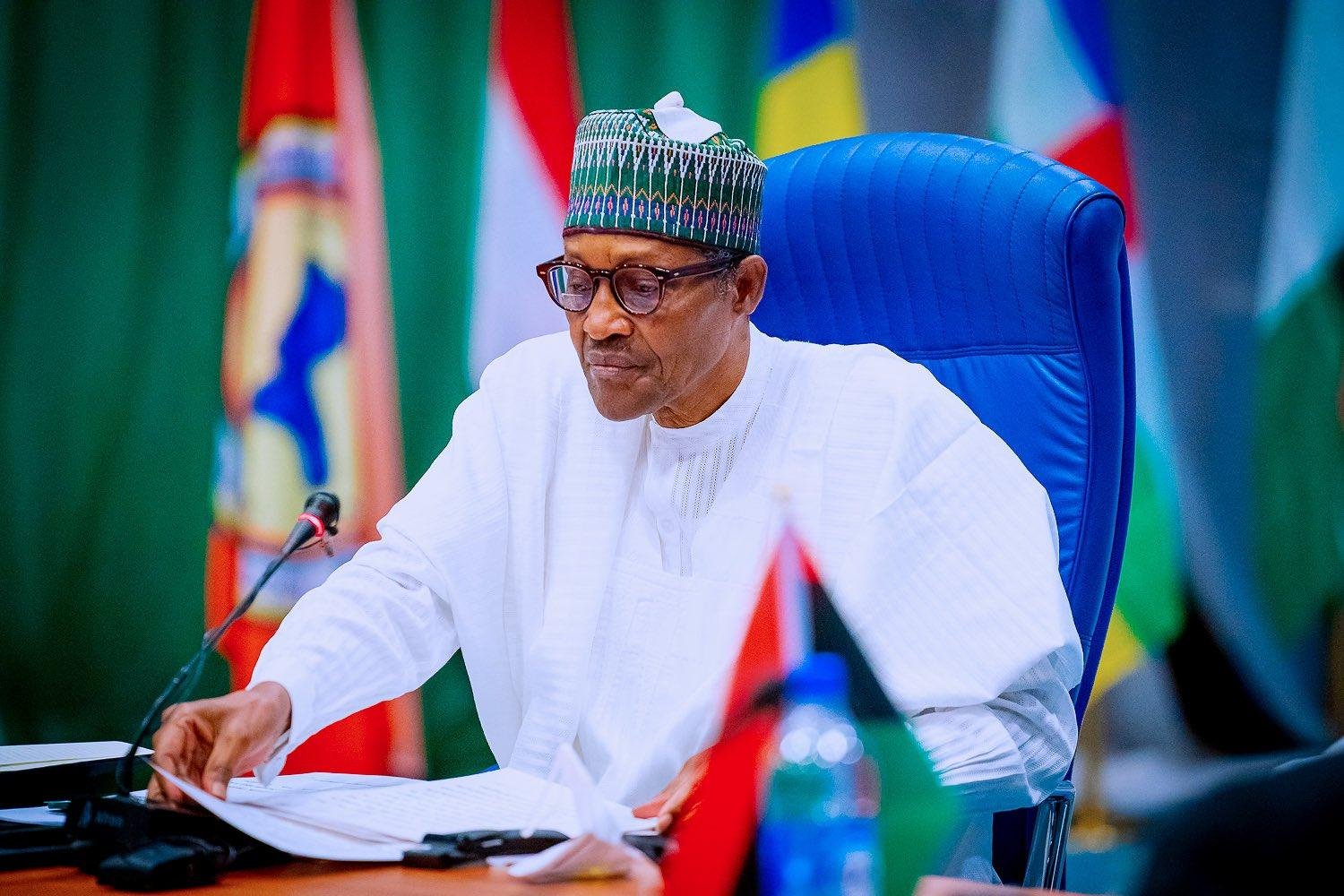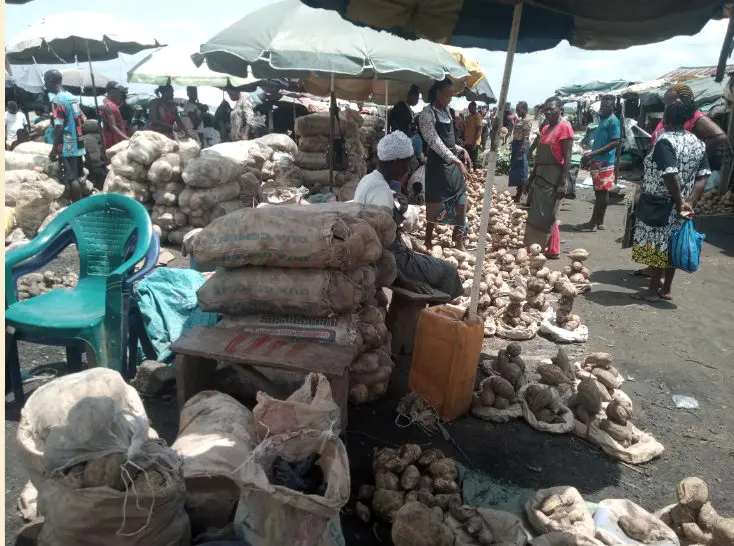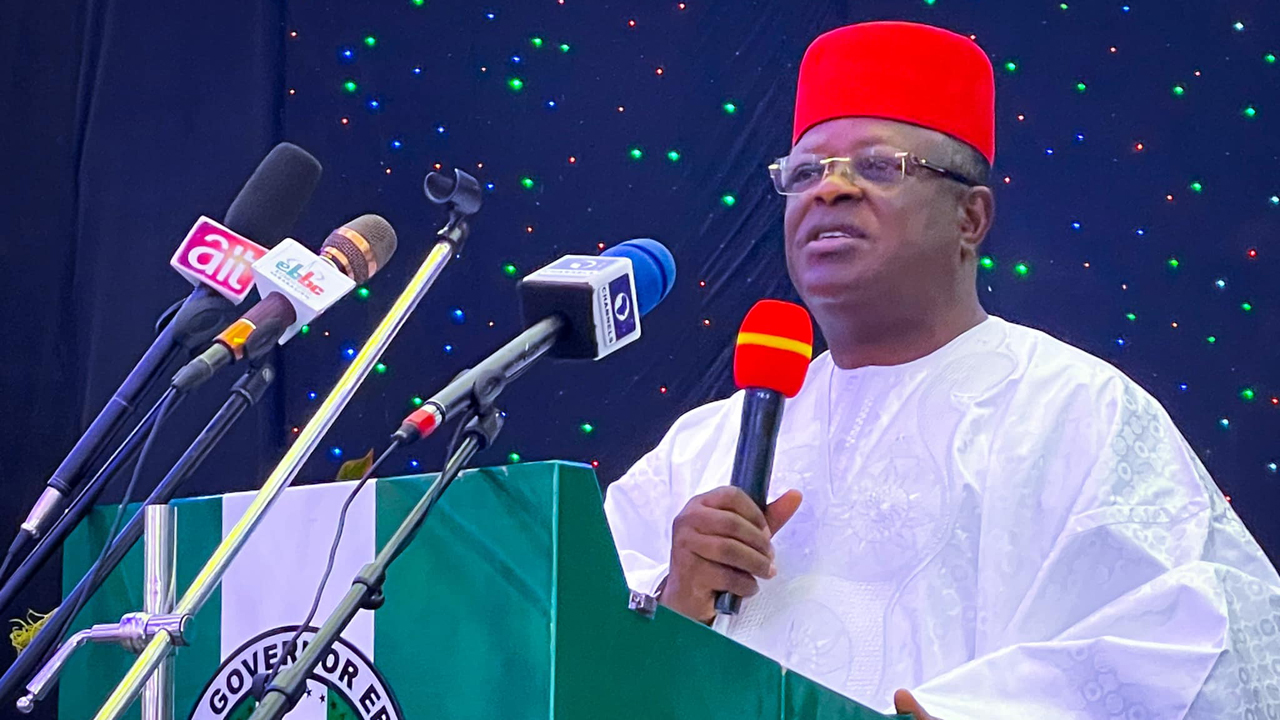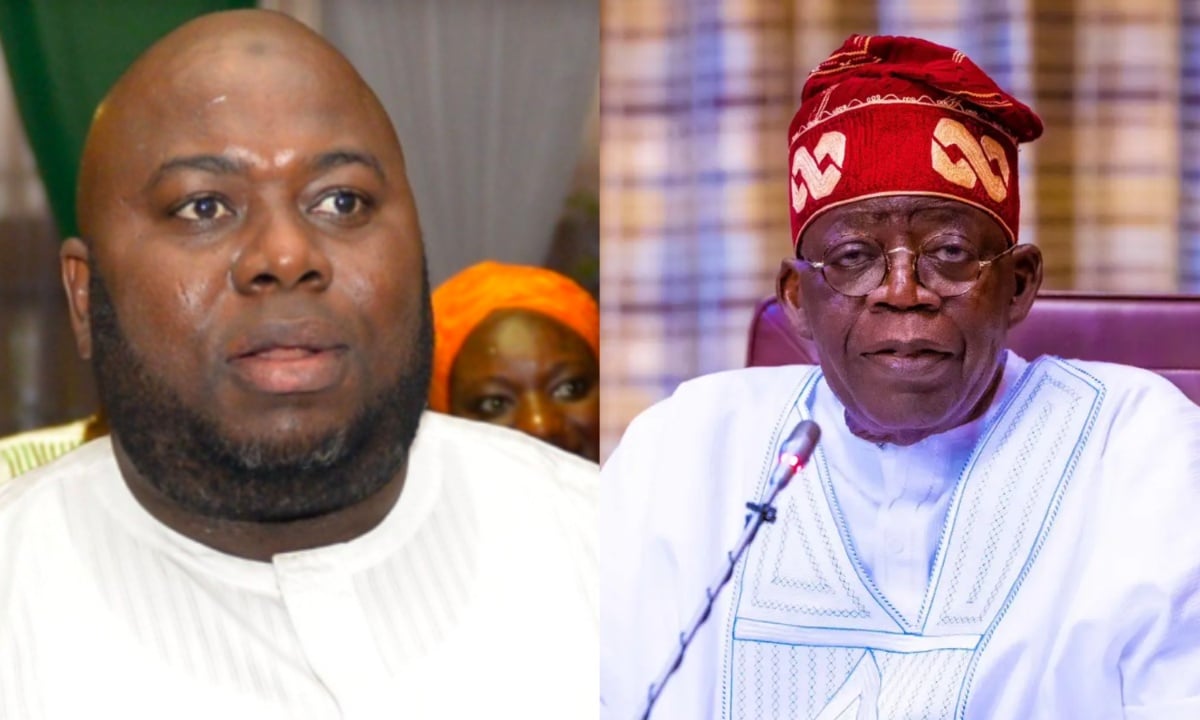Nigeria Breaking News
Buhari’s farewell speech
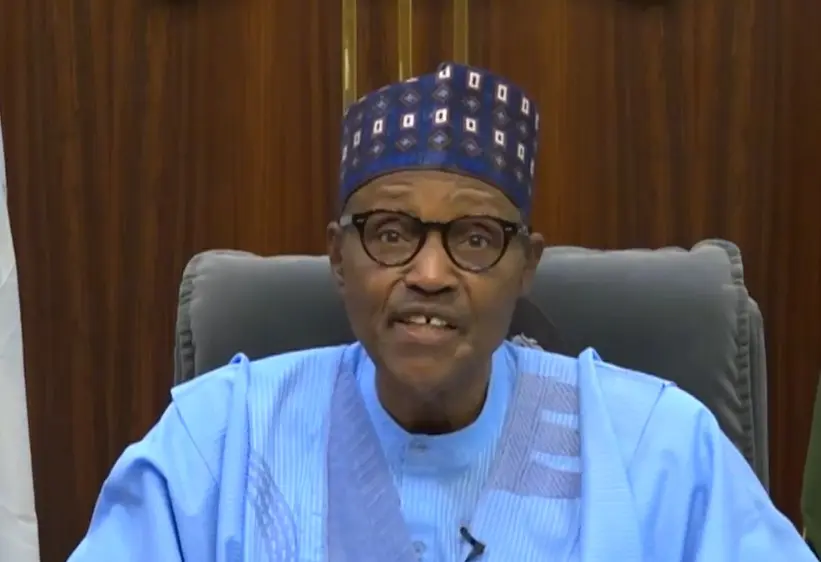
President Muhammadu Buhari addresses Nigerians in a farewell broadcast ahead of his exit from office on Monday. Check out the speech bellow
My fellow Nigerian brothers, sisters, and friends of Nigeria.
I address you today, in my last assignment as a democratically elected President of our great and well-endowed nation, with a deep sense of gratitude to God, a great deal of appreciation to the Nigerian people and a modest sense of fulfillment. Today we mark and celebrate another peaceful transition of power from one elected government to another in our steady march to improve and sustain Nigeria’s democracy. This year we witnessed the most keenly contested Presidential Elections since the first Republic and this demonstrates that our democracy is getting better and more entrenched with each election. We must as a nation improve and sustain gains we make in the electoral process, on an incremental basis for Nigeria to take its rightful place among Nations. Our democracy provides for, allows, and encourages seeking redress for perceived injustices, enabling some candidates and political parties that did not agree with the results to go to court. Irrespective of the outcome of the various cases, I urge all parties involved to accept the decision of our courts and join hands to build a better Nigeria.
I salute the doggedness and resilience of all the Presidential Candidates and their political parties for believing in our judicial system by taking their grievances with the election results to court. In the course of the campaigns, we had argued and disagreed on how to make Nigeria better but we never disagreed or had any doubts that Nigeria has to be better. As your President, I call on all of us to bring to bear the strength of our individualism, the power of our unity, the convictions of our beliefs to make Nigeria work better and together with one spirit and one purpose. To my brother, friend and fellow worker in the political terrain for the past ten years – Asiwaju Bola Ahmed Tinubu -, I congratulate you on the realisation of your dream, which was propelled by a burning passion to put Nigeria amongst the leading nations of the world. You have indeed worked for this day and God has crowned your efforts. I have no doubt that your passion for excellence, reliance on competence, fairness in relationships, commitment to equity, loyalty to the country and desire for Nigeria to be globally relevant would come through for you, under God’s guidance, as you lead our country to levels higher that I am leaving.
You are the best candidate among all the contestants and Nigerians have chosen well. The last eight years have been an exciting experience in my desire and commitment to see a Nigeria in which public goods and services are available, and accessible within a united, peaceful and secure nation. Fellow Nigerians, on the strength of your overwhelming support for me and my political party, I started this journey with a great deal of promise and expectation from you. I never intended to be just politically correct but to do the correct things that will make meaningful impact on the lives of the common Nigerian. This high expectation was not misplaced because, like the ordinary Nigerian, I had grown tired of watching the country progressively moving away from the path of correctness. To ensure that our democracy remains resilient and our elected representatives remain accountable to the people, I am leaving behind an electoral process which guarantees that votes count, results are credible, elections are fair and transparent and the influence of money in politics reduced to the barest minimum. And Nigerians can elect leaders of their choice.
We are already seeing the outcome of this process as it provided an even playing field where persons without any political God-Father or access to money defeated other well-resourced candidates. The Nigerian economy has become more resilient due to the various strategies put in place to ensure that our economy remained afloat during cases of global economic downturns. You would all recall the supply chain disruptions and economic downturn that the world witnessed between 2020 and 2022 as a result of the COVID-19 pandemic. The deftness of our response to the pandemic still remains a global best practice. Furthermore, we increased the ability of the poor and rural Nigerians to earn a living, provided more food for millions in our villages and gave our women opportunities to earn a living. Young men and women in urban centres were also supported to put their skills into productive use. Our administration also provided an enabling environment for the private sector to engage in businesses for which their return on investments is guaranteed.
The private sector proved a strong partner in our drive to build a resilient and sustainable economy as evidenced by the growing number of turn-key projects in various sectors of the economy. In the course of revamping the economy, we made some difficult choices, most of which yielded the desired results. Some of the measures led to temporary pain and suffering for which I sincerely apologised to my fellow countrymen, but the measures were taken for the over-all good of the country. Mindful of the need to ensure adequate infrastructure to drive economic growth, we completed age-long projects and processes notably amongst which are the Petroleum Industry Act, completion of some power projects, completion of the second Niger bridge and various important roads linking cities and states. Our battle to ensure that all Nigerians live in a safe and secure environment has achieved considerable results. As I complete my term in office, we have been able to reduce the incidences of banditry, terrorism, armed robbery and other criminal activities considerably.
To sustain the gains made so far, I call on all Nigerians to be more vigilant and support the security agencies by ensuring that our values defined by being your brothers’ keeper govern our actions. Up-till now, I still grieve for our children still in captivity, mourn with parents, friends and relatives of all those that lost loved ones in the days of the senseless brigandage and carnage. For all those under unlawful captivity our Security Agencies are working round the clock to secure their release unharmed. Fellow Nigerians, you know how dear the desire in my heart is, to rid the country of corrupt practices that had consistently diminished our efforts to be a great country. I did pursue this commitment relentlessly, in spite of the expected push back. I am happy that considerable progress had been made in repatriating huge sums of money back to the country and also taken over properties illegally acquired from our common wealth.
To improve service delivery, we began the implementation of a number of reforms aimed at producing an Efficient, Productive, Incorruptible and Citizen-oriented (EPIC) Federal Civil Service and the results are beginning to show. On the international scene, Nigeria’s influence continues to grow as exemplified by notable Nigerians occupying headship and leadership positions in renowned global bodies. Our democracy is built on and continues to thrive on the principles of separation of powers. The leadership and members of the National Assembly deserve my appreciation for their patriotism which did not detract from their roles as a check to the executive arm. I also want to use this opportunity to express my appreciation to a good number of Nigerians who provided their support and encouragement to help me navigate the exciting journey in moving Nigeria forward. I cannot and will not forget the millions who prayed for me during my illness in my first term of office. I am constantly praying for you and for Nigeria to thrive in peace.
As I retire home to Daura, Katsina State, I feel fulfilled that we have started the Nigeria Re-Birth by taking the initial critical steps and I am convinced the in-coming administration will quicken the pace of this walk to see a Nigeria that fulfils its destiny to be a great nation. I am confident that I am leaving office with Nigeria better in 2023 than in 2015. I thank you all. And may God Bless the Federal Republic of Nigeria.
In other news – Juliana Olayode pens down heartfelt apology to Funke Akindele
Nollywood actresses, Juliana Olayode and Funke Akindele have reconciled after Julina issued a heartfelt apology to her senior colleague Funke Akindele after their fallout of over 6 years.
The rift between the two actresses started in 2017 following Juliana’s appearance in Funke Akindele’s popular series “Jenifa’s Diary.”Learn More
Nigeria Breaking News
Traders blame high cost of food items in Nigeria on insecurity

Nigerian traders are raising concerns about the steep rise in food prices, pointing to widespread insecurity as a major factor driving up costs. As food prices continue to soar, many Nigerians are struggling with the impact of inflation on essential goods, which has been compounded by security challenges across the country. Farmers, traders, and consumers alike are feeling the pressure as insecurity disrupts agricultural activities and transportation, ultimately affecting the availability and affordability of staple foods.
Over recent months, markets in Nigeria have seen a significant increase in the prices of essential food items, such as rice, beans, tomatoes, and maize. According to traders, insecurity in key agricultural regions has made it difficult for farmers to grow and harvest crops safely, leading to a decline in supply and subsequent price hikes. “We’ve seen prices go up by as much as 40% on some items, and it’s largely because farmers can’t operate freely,” said one market vendor in Lagos. “The threat of attacks has forced many to abandon their fields or reduce their production.
In regions like the North-East and North-West, frequent conflicts and bandit attacks have made farming extremely hazardous. These areas, traditionally known as Nigeria’s agricultural hubs, have faced a wave of kidnappings, armed robberies, and violence that has displaced communities and kept many farmers from tending to their land. The implications are widespread, as disruptions to farming create shortages of produce that ripple through the supply chain, impacting food availability nationwide.
Traders blame high cost of food items
Transportation of goods is also increasingly risky, with traders citing roadblocks, ambushes, and high security fees as reasons for soaring transport costs. Farmers and distributors have to navigate through unsafe routes, where they risk being targeted by armed groups. To cover these risks, traders are left with little choice but to raise prices, passing the burden onto consumers. “We are paying more to get our goods to market. It’s not safe to travel anymore without worrying about being attacked or losing everything,” explained a wholesale trader in Kano.
Analysts have noted that these security issues are particularly problematic for rural communities, where the majority of farmers reside and where poverty rates are highest. Insecure conditions have forced many farmers to either abandon their livelihoods or limit production, exacerbating poverty and food scarcity in already vulnerable areas. According to the World Bank, Nigeria’s inflation rates remain high, with food inflation surpassing general inflation. While other factors, such as global supply chain disruptions and rising fuel costs, also play a role, local insecurity is seen as the primary factor that sets Nigeria apart from neighboring countries facing similar global pressures.
In response, some farmers have tried to adapt by relocating to safer areas or diversifying their crops to reduce losses. However, these measures are only temporary solutions, and farmers say that lasting change will require a stronger government response to security threats. Many are calling on the government to take immediate action to address insecurity, arguing that until the safety of farmers and transport routes is guaranteed, food prices will continue to remain high.
Government officials have acknowledged the security challenges facing the agricultural sector and have made several attempts to increase military presence in affected areas. Additionally, authorities are working to implement initiatives aimed at promoting agriculture, such as subsidies for farm equipment and the introduction of security measures to protect farmers and traders. However, critics argue that these efforts have yet to yield tangible results, as insecurity continues to disrupt food supply chains and strain the economy.
The impact of rising food prices has been felt across Nigeria, especially among low-income households that are finding it increasingly difficult to afford basic necessities. Consumers are adjusting by purchasing smaller quantities, opting for lower-cost alternatives, or even skipping meals altogether. “We have no choice but to buy less,” said one shopper in Abuja. “Everything is expensive now, and our salaries haven’t increased to match the prices.”
In the long term, experts warn that if the insecurity crisis is not addressed, Nigeria could face severe food insecurity, with even higher prices and potential shortages of key items. They stress the need for an urgent, comprehensive approach to tackling insecurity in agricultural zones, including enhanced policing, community engagement, and partnerships with local leaders to promote stability.
In summary, traders across Nigeria continue to link high food prices to widespread insecurity, which has disrupted farming, reduced crop output, and raised transport costs. As food prices surge, the call for action grows louder, with Nigerians urging the government to ensure the safety of farmers and protect the country’s agricultural backbone.
Source: Dailpost
In other news -Nigeria Needs Over N19 Trillion to Complete Inherited Road Projects, Says Minister David Umahi
The Nigerian government faces a daunting financial challenge in its quest to complete numerous road projects inherited from past administrations, according to Works Minister David Umahi.
Speaking at a recent press briefing, Umahi revealed that the country needs more than N19 trillion to finish these projects, highlighting the significant financial strain and infrastructural backlog that the government must address. Read more
Nigeria Breaking News
Nigeria Needs Over N19 Trillion to Complete Inherited Road Projects, Says Minister David Umahi

The Nigerian government faces a daunting financial challenge in its quest to complete numerous road projects inherited from past administrations, according to Works Minister David Umahi. Speaking at a recent press briefing, Umahi revealed that the country needs more than N19 trillion to finish these projects, highlighting the significant financial strain and infrastructural backlog that the government must address.
The staggering amount required underscores the vast scale of unfinished road infrastructure across Nigeria. Umahi emphasized that these projects are crucial to economic growth, given that improved road networks can boost trade, reduce transportation costs, and increase regional connectivity. However, the budgetary demands have left the government grappling with how to balance competing priorities while addressing the urgent need for infrastructure development.
According to Umahi, most of these road projects span several years, having been initiated by previous administrations with minimal completion progress. “Many of these projects have stalled due to insufficient funding, poor planning, and, at times, contractor inefficiencies,” he explained. The scope of work includes major highways, bridges, and rural roads, which are critical for connecting Nigeria’s urban centers to its more remote regions.
The N19 trillion figure comes as Nigeria faces fiscal constraints exacerbated by global economic challenges, fluctuating oil prices, and a high debt burden. To make up the shortfall, Umahi mentioned that the government is exploring alternative financing options, including public-private partnerships (PPPs), concessional loans, and private investments. These approaches are intended to ease the immediate budgetary load while still progressing on essential infrastructure projects.
Nigeria Needs Over N19 Trillion
Umahi also noted the importance of prioritizing which roads should be completed first, given the limited resources. Roads that serve high-traffic corridors and those connecting economically significant regions will likely be addressed ahead of less critical routes. “We need to make strategic decisions on which roads can provide the maximum benefit in the shortest possible time,” he stated. By focusing on high-impact projects, the government hopes to deliver immediate benefits to the economy and improve quality of life for Nigerians.
One of the primary challenges the Ministry of Works faces in this endeavor is managing ongoing maintenance alongside new construction. Nigeria’s hot and rainy climate, combined with the heavy loads often transported on these roads, has contributed to faster-than-expected degradation of existing infrastructure. Umahi emphasized that any new projects will need to consider these factors to ensure that completed roads are more durable and sustainable.
To that end, the government has initiated several policy reforms aimed at improving the construction standards of road infrastructure. Umahi expressed a commitment to transparency and accountability in these projects, promising that contracts would be awarded based on merit and capability rather than political affiliations. “We cannot afford to cut corners or waste resources on substandard work,” Umahi asserted, adding that the government will closely monitor progress and conduct periodic reviews of all ongoing projects.
Beyond public partnerships and improved oversight, Umahi called on the private sector to play a more active role in road infrastructure development. He encouraged private entities to participate in financing road projects, either through direct investments or by adopting build-operate-transfer (BOT) models that would allow them to manage and profit from the infrastructure over a set period. Such arrangements could accelerate road construction and provide private investors with long-term revenue opportunities.
The announcement has stirred a wide range of reactions from Nigerians, with some expressing frustration at the prolonged delay in addressing road infrastructure, while others commend the transparency in disclosing the financial needs. Analysts point out that a proactive approach involving private sector collaboration could mitigate the impact on Nigeria’s limited resources and alleviate some of the public sector’s financial burden.
Umahi’s emphasis on accountability and the exploration of alternative financing options marks a shift in how the Nigerian government approaches infrastructure challenges. While the N19 trillion requirement reflects years of underinvestment and inadequate planning, the government’s renewed commitment to transparency and efficiency may signal a more sustainable path forward.
In conclusion, as Nigeria strives to complete its extensive road projects, the financial demands pose a substantial hurdle. However, with the right mix of strategic prioritization, private sector involvement, and policy reforms, the government aims to bring these long-awaited infrastructure projects to completion. For Nigerians, the hope remains that this commitment will result in safer, more reliable roads that can support the nation’s development well into the future.
Source: Dailpost
In other news – Asari Dokubo Reveals He Declined Pipeline Contract Offer from Bola Tinubu
Asari Dokubo Reveals He Declined Pipeline Contract Offer from Tinubu. In a recent statement that has stirred discussions across Nigeria, former Niger Delta militant leader Asari Dokubo disclosed that he turned down a pipeline contract offer from President Bola Tinubu.
Known for his outspoken views and often controversial remarks, Dokubo shed light on the circumstances surrounding the offer, as well as his reasons for declining it. Read more
Nigeria Breaking News
Ogun govt advocates proper documentation in orphanages

Ogun State Commissioner for Women Affairs and Social Development, Adijat Adeleye, has harped on the need for proper documentation of children in orphanages residing in the state. Adeleye stated that improved data analysis is necessary to ensure accountability, safety, transparency, and efficiency in the administration of homes.
The commissioner made this known during a training program for social workers, organized by the Ministry in collaboration with Both Ends Believing (BEB) and the Association of Orphanage and Home Operators in Nigeria (ASOHON) at Oke-Mosan, Abeokuta, on Friday.She reiterated the state government’s commitment to the welfare and well-being of all children in the state, regardless of their status, noting that their rights must be protected and that they should have a sense of belonging.
Adeleye said: “I want you to know that the present administration in Ogun State is committed to the welfare of all children in the state, and the era of being complacent is gone; whether as social workers or orphanage home operators, this time there is a need for us to have proper documentation of what is going on in our homes, both for present reasons and for the future of the children and the homes we run.”
The commissioner urged the trainees to take advantage of the training to enhance their career paths and provide efficient services in their line of duties.
Speaking, the National President of the Association of Orphanage and Home Operators in Nigeria, Dr. Gabriel Oyediji, explained that the objective of the training was to ensure a paradigm shift in keeping children’s records from analog to digital, towards achieving accuracy and timeliness in the management of children’s welfare.
Delivering a lecture on creating child-first software for orphanage homes, the Country Manager of BEB, Mr. Silas Nyam, highlighted some of the benefits of the software application for orphanage homes, which include storing and tracking children’s personal, medical, and educational records, monitoring children’s progress, goals and outcomes, and managing counseling therapy, among other things.
Appreciating the Ministry and other partners, representatives of the social workers, Adesola Omobolaji and Talabi Olusesan, said the training would be beneficial in enhancing quality service delivery in the discharge of their duties.
Source: Dailypost

